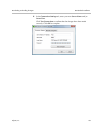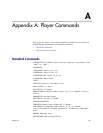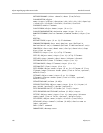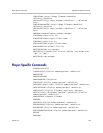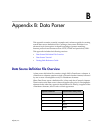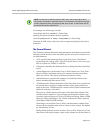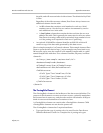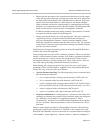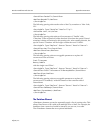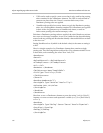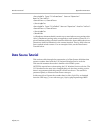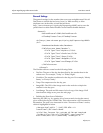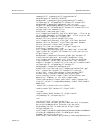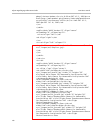
Data Source Definition File Overview Appendix B: Data Parser
Polycom, Inc. 173
the table, and will create an index for this column. The default for KeyField
is False.
Regardless of the table structure schema, Data Parser always inserts two
additional columns into the table:
— An ID column that contains a serial number for each row. Serial
numbers start at 1 for the first row and are incremented by one for
each additional row in the table.
— A Last Update column that contains the date and time the row was
added to the table. This is generally the same value for all rows, unless
Data Parser is creating a table with a particularly large number of rows
or if the parsing work required for each row is quite long.
• An optional <PublishFile> element identifies an XML file which will
contain a copy of the data table generated by this data source.
Here is a simple example of a <General> element. This example instructs Data
Parser to parse the data feed at http://www.example.com/news.html every
300 seconds, and to store the results in a file named Example.mdb, in a table
named SampleTable with three Text columns: Headline, Reporter, and Date.
<
General>
<Url>http://www.example.com/news.html</Url>
<Database>Example.mdb</Database>
<AllowDuplicates>True</AllowDuplicates>
<RefreshInterval>300</RefreshInterval>
<TableStructure>
<Field Type="Text">Headline</Field>
<Field Type="Text">Reporter</Field>
<Field Type="Text">Date</Field>
</TableStructure>
</General>
The ParsingRule Element
The <ParsingRule> element is the backbone of the data source definition. The
purpose of this element is to extract text from a source, optionally manipulate
the extracted text in some way, and place the result in a destination. It helps to
think of sources and destinations as containers of text.
A <ParsingRule> element can contain other <ParsingRule> elements. Child
<ParsingRule> elements are run after the parent rule.
The <ParsingRule> element has 3 required attributes:
• Type specifies the type of parsing rule to be used. See the Data Source
Definition Reference Guide for a complete list of parsing rule types.



